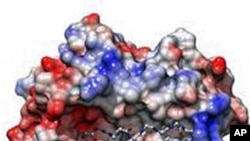Scientists believe they have discovered why some people who are infected with HIV, the virus that causes AIDS, can survive for decades without treatment. The research could open up new avenues to an AIDS vaccine.
Approximately one in 300 individuals infected with HIV is naturally able to suppress the virus.
This special immunity has baffled and intrigued AIDS researchers, including Bruce Walker, director of the Ragon Institute of Massachusetts General Hospital, MIT and Harvard University in Boston.
"For a long time we have been trying to understand why is it that some people HIV-infected and develop AIDS within a year and others have survived, some of them up to three decades now without ever getting sick, despite never having taken any medications," said Walker.
Seeking an explanation for the phenomenon, Walker and an international team of researchers compared the DNA of 1,000 so-called "controllers" to that of 2,600 individuals with progressing disease, looking for clues among the human genome's three-billion genetic amino acids or building blocks
"It boils down to just a handful of them that make a difference in terms of whether you control the virus well or do not control the virus well," he said. "And those few amino acids that we have identified, those few building blocks, all relate to a particular arm of the immune systems that really helps focus us in terms of what it is that is important in terms of control."
Scientists say they found small differences in five amino acids in a protein called HLA-B, which is essential to the proper functioning of the body's defenses.
Experts say HLA-B alerts the immune system to the presence of virus so it can destroy HIV-infected cells.
Walker says scientists still have a ways to go in understanding how the HLA-B variants work to create a kind of super immunity in some HIV-infected individuals.
"To me that is encouraging because that is what we do with vaccines, we manipulate the immune system," said Walker. "And so I am hopeful that we will be able to take this information that essentially tells us there are certain immune responses that are being generated that work really well and others that do not work well at all, and be able to dissect that - to figure out how to induce good responses - and avoid responses that are not helpful."
An article on the role of genetic variants in HIV longevity is published in the journal Science.
Key to Long -Term Survival with HIV/AIDS Discovered




